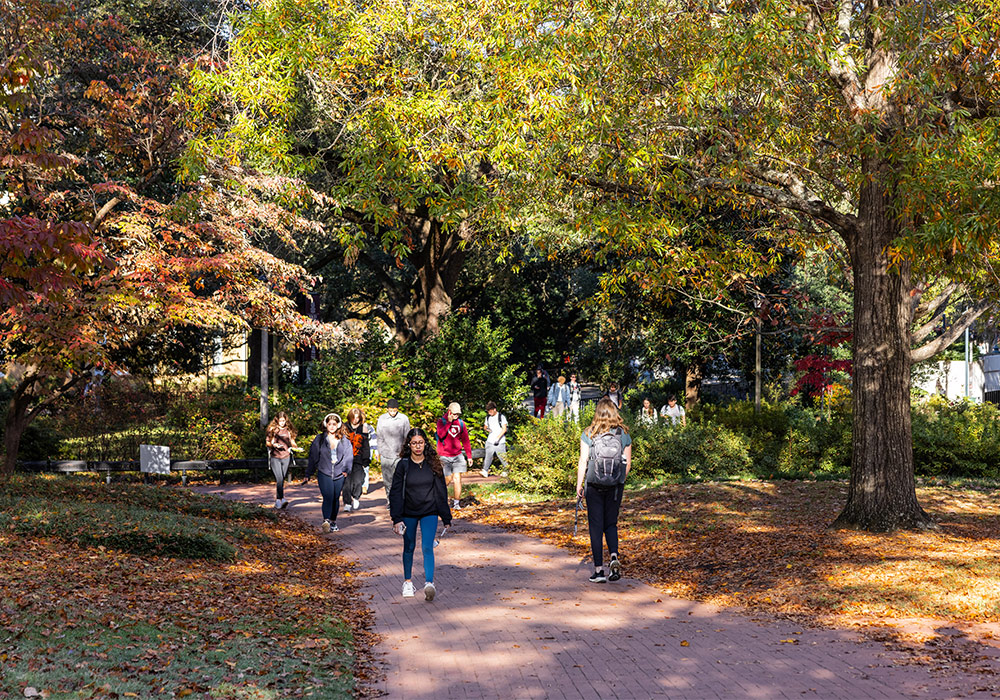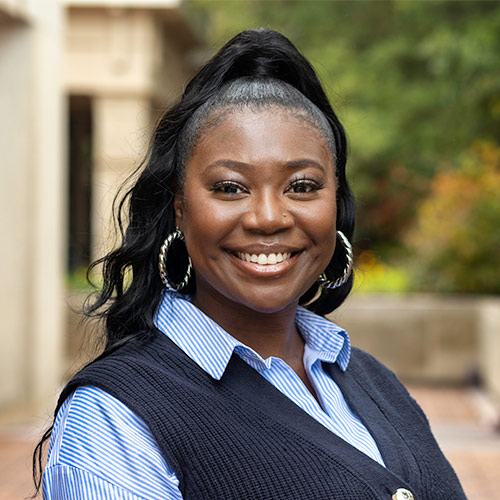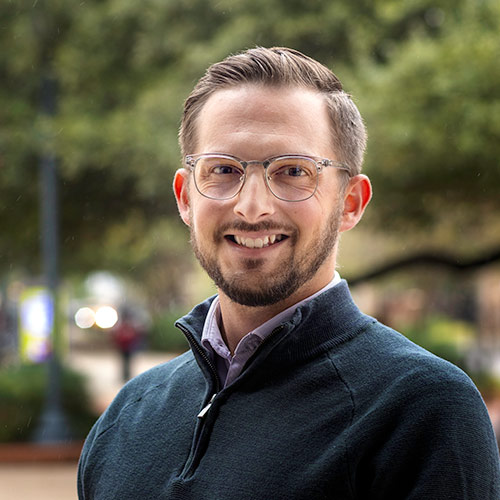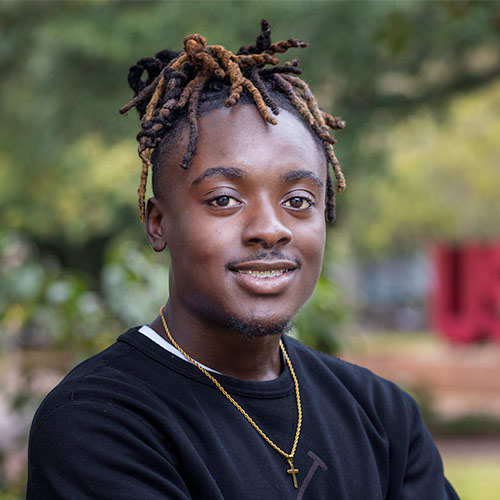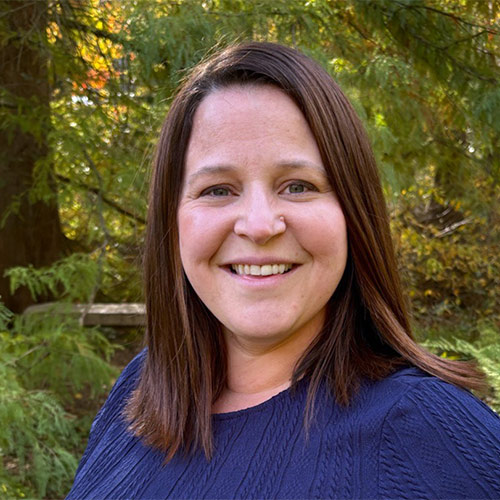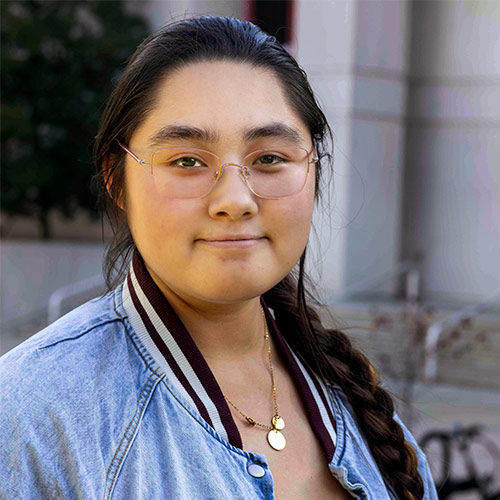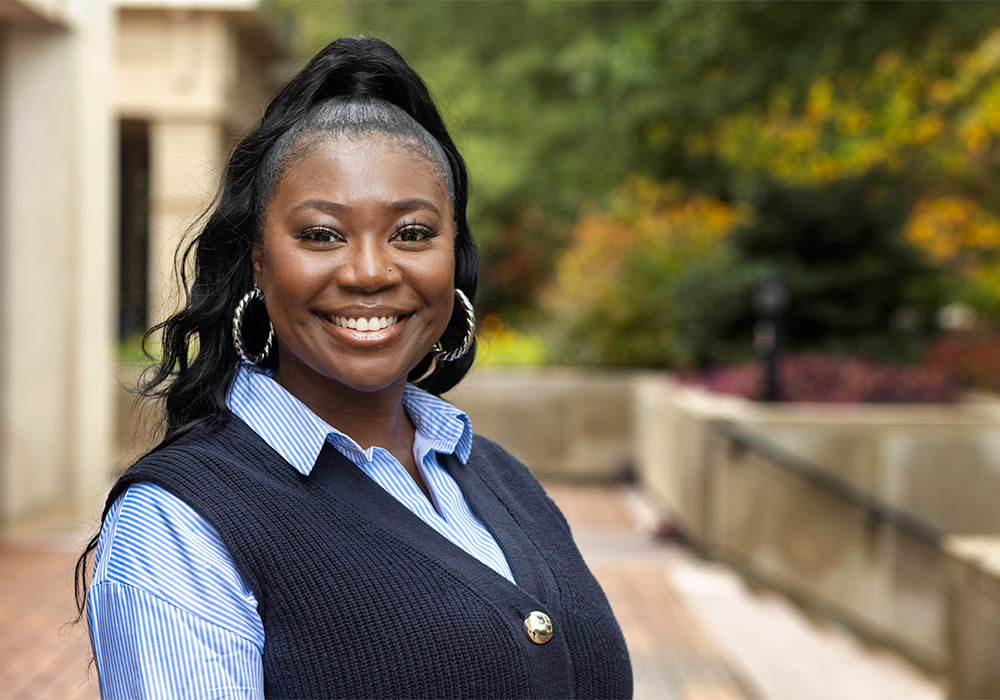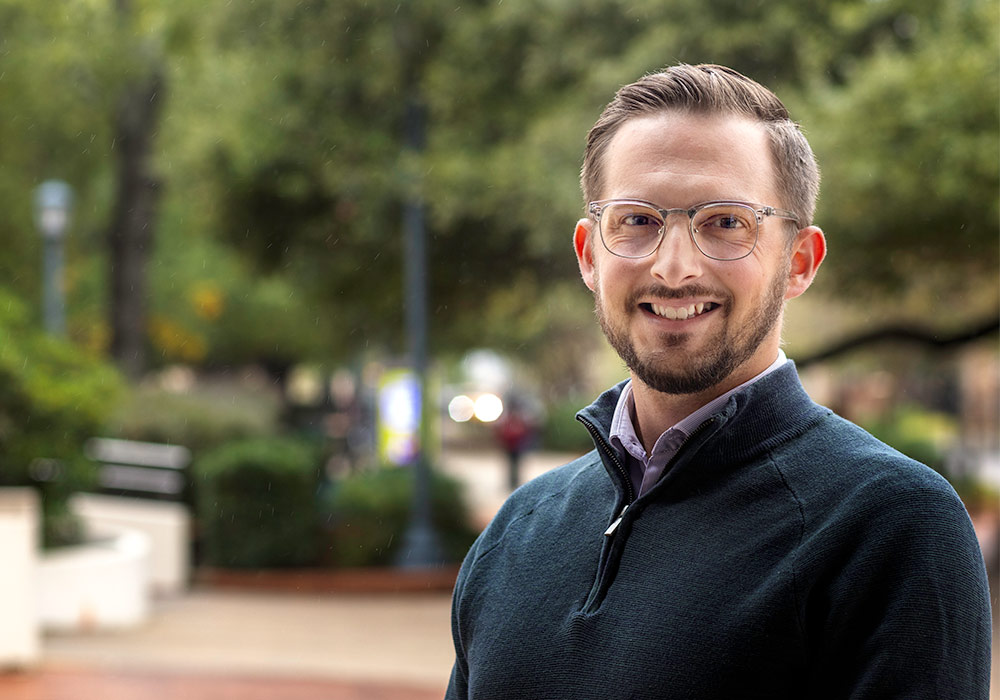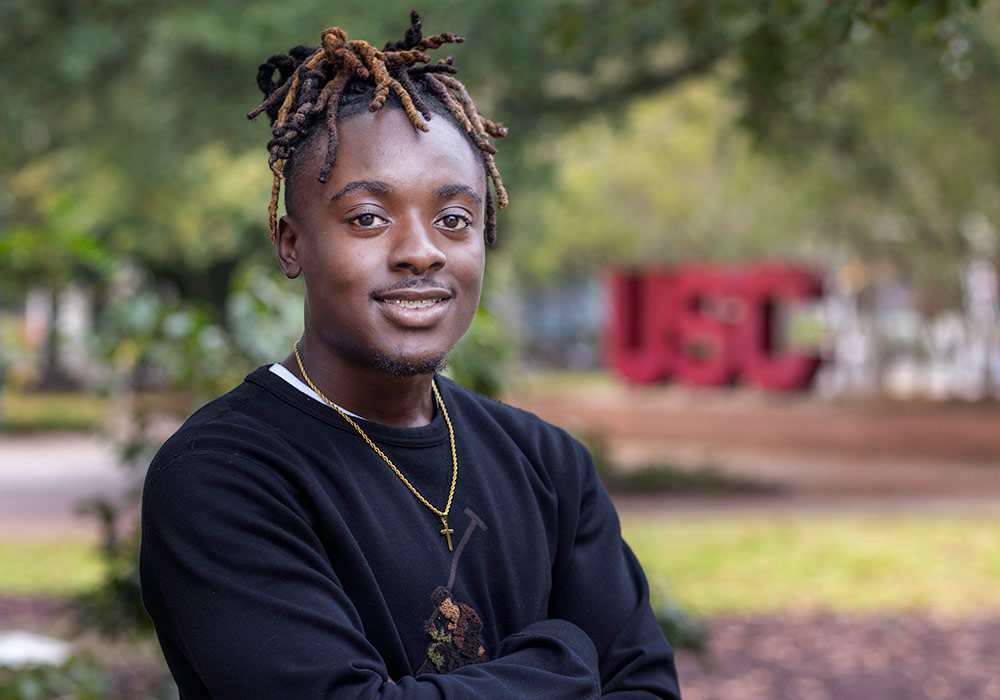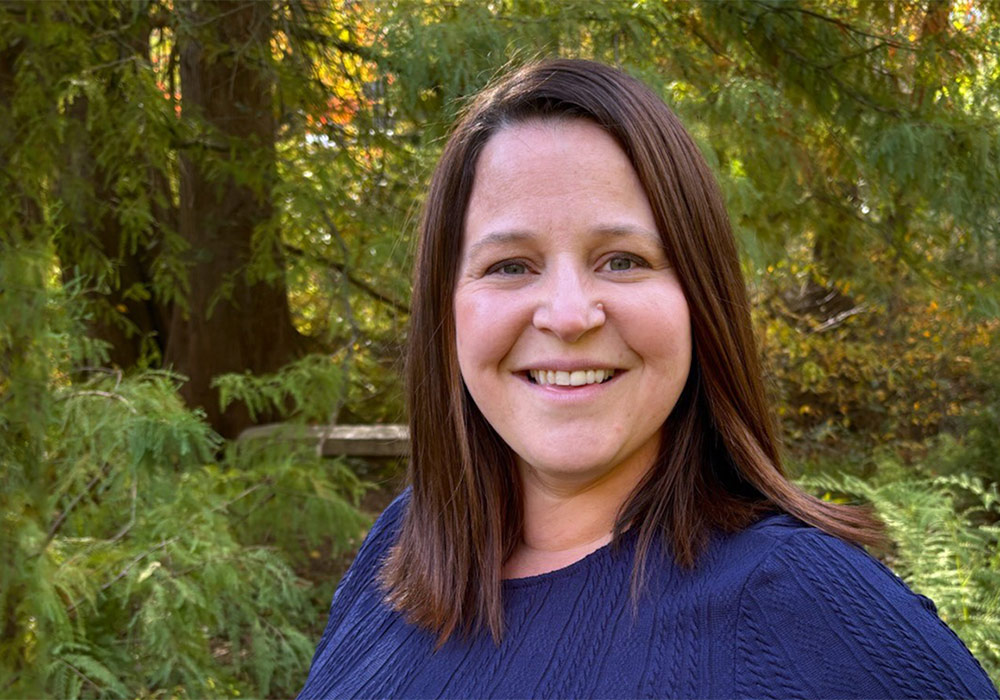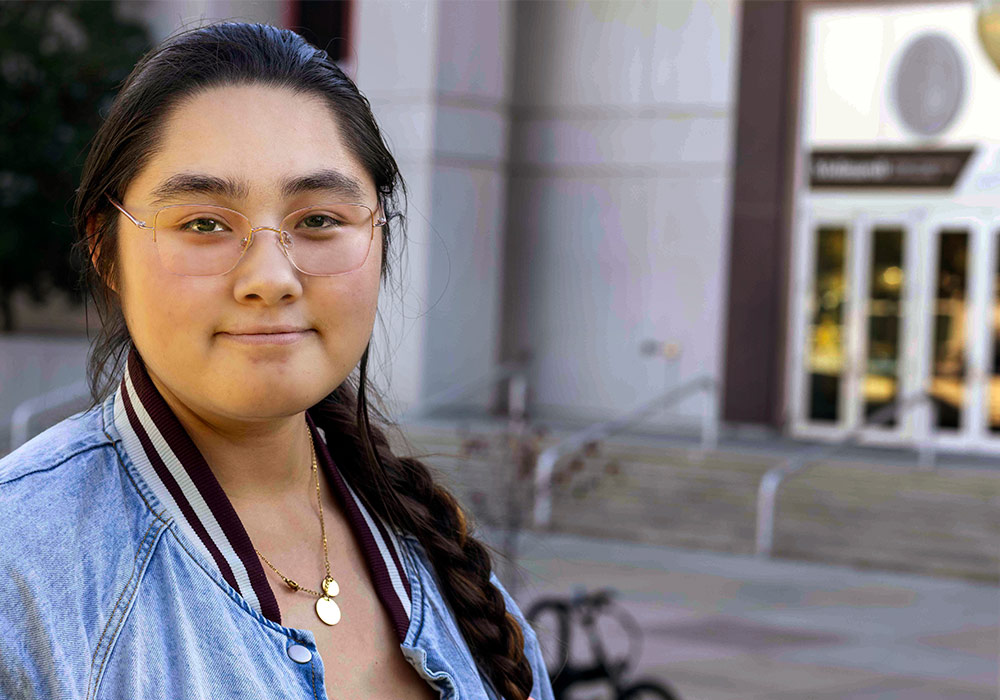First-generation college students come from all sorts of backgrounds and bring myriad perspectives to the University of South Carolina campus.
At USC, about one-fifth of the student population — more than 7,000 — are considered first-generation, meaning their parents did not complete a bachelor’s degree. Across the country, nearly 5 million undergraduate students identified as first-gen in 2020, one in every three students.
“First-generation students are trailblazers and their willingness to be ‘first’ demonstrates their belief in the transformative power of higher education,” says Althea D. Counts, executive director of TRIO Programs at USC. “There are first-generation students in leadership roles on campus and in our classrooms, bringing diverse lived experiences that are essential and enrich our campus environment.”
As the university marks the celebration of First-Gen College Celebration Week Nov. 3-7, we caught up with first-generation students, alumni, faculty and staff who are thriving in the classroom and beyond.
Faces of first-gen
Karra McCray Gibson grew up in the tiny South Carolina community of Dunbar in rural Georgetown County, where her childhood days started with some rules set down by her mother.
“Before we could go outside in the summer, we had to read books. My mom would quiz us and make sure that we could identify the setting and the main characters in the story before going outside. And we had to write,” Gibson says. “I hated it at the time, but I'm so grateful now.”
The commitment to education Gibson's mother stressed in their home served her daughter well. Gibson graduated as the valedictorian of her class at Carvers Bay High School. She had plenty of college options but decided to stay in-state where she received scholarships and the support of programs like the Opportunity Scholars at USC.
“I knew ever since I was a young girl I wanted to go to college,” she says. “It just made the most sense for me to come here. And I was able to graduate undergrad debt-free. So that was a really good decision.”
She was a member of the TRIO program at USC, which helped her adjust from life in a small town to navigating a large campus.
“I remember feeling very overwhelmed but also excited at the same time,” she says. “Being first-gen, in addition to the culture shock, I didn’t really know what I could ask or should ask. I was grateful for opportunities like the TRIO program, because not only were there resources and faculty and staff there who understood, I think it actually provided me with confidence that I could compete and excel academically and socially, even on a large campus.”
Once on campus, she jumped into activities — including being president of Alpha Lambda Delta honor society, pledging Alpha Kappa Alpha sorority and holding down a part-time job. She also landed a job with her state representative — who asked her at her high school graduation if she was interested in working for him as a legislative aide at his office in Columbia.
Her original plan was to attend law school, until former TRIO director Paul Beasley suggested she apply for the Ronald McNair Scholars summer program, established to prepare participants for graduate school through research and other scholarly activities. She participated in the program the summer before her senior year, and she says it changed the trajectory of her life.
“Being from a small town, and also first-gen, I didn't necessarily see a professor as a career path. I didn't know that was possible. I didn't know what it would entail. I didn't know the benefits,” she says. “And so it was truly that program and being able to work on an independent research project, where I end up winning an award at the annual conference, that truly ignited my passion and showed me that this was something that I could do, but also that I could be good at it if I worked hard enough.”
After graduating with degrees in political science and English, she went to Howard University for her master’s in Black politics and American politics before heading to the Ivy League where she earned her doctorate from Brown University. She defended her dissertation in June and came home to USC this fall as an assistant professor of political science.
“It’s such a full circle moment that I could not have imagined when I left almost 10 years ago,” she says. “But it’s so rewarding to be back.”
And, now at the front of the classroom, she says she starts each course with an introduction that includes more than just listing her degrees.
“I tell them where I'm from and show it on a map. I say that I'm first-gen. I want all students who come to my class to know that if someone like me could do it, anyone else could.”
Austin LaForest recalls the questions he asked himself during his freshman year as a first-generation college student at Ohio University.
“Do I belong here? Am I going to be found out that I’m not smart enough?” he says. “I hadn’t traveled much outside my area, and there are people here from all over the world and people who have traveled the world. So, I definitely felt out of place. And I struggled academically.”
He remembers the feeling — and he uses it now to counsel and relate to students in his job as director of student care and case management at USC.
After all, it was mentors, faculty and administrators who inspired him as an undergraduate and helped him find his path.
LaForest grew up in Galion, Ohio, a town of about 10,000 people surrounded by cornfields between Cleveland and Columbus. His father worked in the steel mill and his mother held a variety of jobs — from working in a photo lab to a bank.
He credits his mom with pushing him to attend college. She had worked full time while she was in high school and wasn’t able to make her dream of going to the local community college a reality.
“Growing up, her message to me was, ‘I don't care. You are going to work hard in high school. You are going to college. That’s going to be your No. 1 priority.’ So that was a consistent message growing up. I would have been terrified to tell my mom I wasn’t going to college.”
In high school, he had the opportunity to be a part of a first-generation college student program called Seniors to Sophomores. As a senior, he took classes at a community college about 20 minutes from home, earning a full year of college credit by the time he finished high school.
He enrolled at Ohio University in Athens, Ohio as a physics major, switching his second quarter to political science. By the end of his freshman year, he switched to education, and graduated with a degree to teach social studies.
But it was the relationships he built with student affairs administrators as an undergraduate that helped steer his career.
“They were really instrumental in helping me understand what I could do, what my potential was. They made me feel like I belonged,” he says. “Meeting people and getting involved was really life-changing for me.”
By his senior year, he decided to go to graduate school for higher education student affairs.
“And that started my journey of working on college campuses and really being passionate about being a resource for students the way that so many people were for me.”
He arrived at USC in 2018, and now oversees the care and outreach team in Student Affairs. His journey as a first-generation student influences his job now, he says, by making him realize that every student comes to college with different experiences.
“I try not to go into a conversation with assumptions and try to be curious about the student that I'm sitting with. And, especially for students who may feel more like nontraditional students, I share with them that there are many students walking on campus who are also feeling the same way, asking ‘Do I belong here? Do I fit in?’”
He says his job is to reassure them of their place and their value as part of the USC community.
“One first-gen student’s experience can look totally different from another first-gen student. So, it’s not that we necessarily share every single lived experience. It's more about that shared connection of like, ‘Hey, I’m the first person who’s doing this. And I'm proud of overcoming some obstacles and some hurdles.’ That’s a really great connection point that I can make with the students.”
Kelvin Pearson always knew he would attend college. At career day in elementary school, he announced he would be a lawyer, and he hasn’t strayed from that path.
He was a high achiever, always in gifted and talented classes in school. “When I made one C in high school, I almost cried,” he says. “So, yeah, I expected to come to college.”
He graduated at the top of his high school class in Manning, South Carolina, and earned a full ride to USC, where he is a sophomore majoring in political science. And he still has his eyes set on law school.
He also understands the significance of being the first member of his extended family to attend college, and he feels a responsibility to his hometown and his community. The role of “role model” is one he embraces.
“To me, I am very proud to be a first-generation student. It means I’m breaking the stereotypes,” Pearson says. “A lot of people wouldn't have expected someone from my community to come to college. I was the only Black male in the top 20 of our high school class. For someone like me, to do that and break those barriers, it shows not only that we are capable, but it also shows that others like me at my high school can do that as well.
“And I just like being that role model for other people.”
He credits TRIO for helping him find a home — along with friends and mentors — at USC.
“TRIO has meant everything to me. They gave me mentors. They always stayed on me and made sure I got my assignments done. And when I just needed someone to talk to, I had someone to talk to,” he says. “I went through a period when my great-grandmother died, and I just really felt at my lowest. I still had my mentor there to help me. It was like comforting me, make sure I was straight, but also make sure my coursework was still getting done. Because this is still school and life happens, and we do need to grieve but also push past it.”
TRIO also allowed him to have a place to go during his free time where he could meet new people and find friends with similar backgrounds. The tutoring center at TRIO helped him both academically and socially, with tutors becoming friends.
He was named Mr. Freshman by the Association for African American Students and was selected to be a summer orientation leader, helping new freshmen find their paths at USC. And he became more involved in TRIO, serving as co-chair of the student lead team, which advocates for students.
“I can help incoming freshmen by pushing past some of those barriers that I saw myself during my freshman year. As a first-generation student, yes, you’re the first to do what you've done, but you also need to make sure you’re not the last. Continue to help the people that came after you; help them break the barriers that you broke.”
Ashley Thomas saw firsthand what TRIO could do for first-generation students on the USC campus. It made such an impact on her that she worked to implement some of the benefits of the program in her accounting career.
Thomas grew up in Myrtle Beach, thinking she would become an architect. But a high school accounting class introduced her to the field and to a retired partner at accounting firm Ernst & Young. She changed her career sights and made the decision to be a Gamecock.
“I am a first-generation college student, but there was never an option that I wasn’t going to go to college,” Thomas says. “Neither one of my parents went and none of my grandparents went, but I don’t remember a time growing up that it wasn’t like ‘You’re going to college.’”
At USC, she qualified for the Pell Grant, and the TRIO office offered her a scholarship.
“Both my parents were (living) paycheck to paycheck, so I was going for every scholarship I could get,” she says. “So when they reached out and I met them, I got really excited about it.”
She majored in accounting, but taking a class with English professor Ruth Strickland led her to add a minor in English and learn a skillset that she didn’t even know she wanted — the ability to write clear, argumentative papers. Thomas earned her undergraduate degree in accounting in 2006 and stayed on as Strickland’s graduate assistant while she earned her master of accountancy the following year.
As her accounting career took off, she worked for Thermo Fisher Scientific, a massive firm that provides a range of products and services for scientific research, diagnostics and manufacturing. During the summer of 2020, when protests surrounding the death of George Floyd filled the news, Thomas said the company took an active role in reaching out to different groups of people. Thomas became part of the team trying to figure out ways to reach college age students,
“The idea was to get people of color to be scientists or accountants or whatever. So I said, ‘I know this great organization. It’s TRIO.’ We ended up basically creating a partnership between Thermo Fisher and TRIO.”
Thomas said the idea was basic — putting together presentations for first- and second-year college students to teach budgeting skills along with exposing them to types of careers that are possible at Thermo Fisher.
“It was to offer a service to be like, ‘Hey, we’re kind of nerdy accountants. But we can tell you a few things that hopefully can give you some value as college students.’ Some of it was things I wish I would have heard as a freshman, like not to take out that credit card. But we were doing it with students that probably wouldn't know anything about Thermo Fisher because their parents weren't in the scientific research world.”
She says the program reached about 500 students across the country.
“I found so much value in TRIO and what it's doing for students that I continue to want to be involved wherever I can. And a lot of that's because of (USC TRIO director Althea) Counts and the teachers. But it’s also because, while I still would have gone to school without TRIO, I know there are other students that wouldn’t. It’s such a critical organization.”
Thomas has moved to a new job as the global controller for Bioventus, a medical device company. She is based near Chapel Hill, North Carolina. And she says she hopes her new firm will eventually forge a connection with TRIO.
And she has some advice for employers looking to recruit and hire job candidates looking for their first job: Choose first-generation college graduates.
“I guarantee you that person had to work harder,” she says. “And they will work much harder as an employee. I know what they’ve been through. To me, that person is going to be a much more dedicated employee than the person that had their parents pay for their school 100 percent.”
Nobody in Grace Ware’s family expected her to go to college.
An Army brat, she was born in California and grew up on military bases in New York, Arizona and Georgia. She graduated from high school in Myrtle Beach.
Her father was insistent on her joining the military as her older brothers had done. Her mother told her she wasn’t smart enough to go to college, and she would have to get a full ride to attend.
But Ware knew she didn’t want to enter the military. She wanted to go to a research university and look at a career in research or medicine. USC fit the bill. She earned scholarships and qualified for the TRIO program.
She is now a sophomore majoring in biomedical engineering and is a teaching assistant in Physics 211.
It hasn’t been the easiest road. Ware says she was a rebellious teen — her mother kicked her out of their house when she turned 18. She stayed at a friend’s house in the months before she moved to Columbia to attend USC.
“It sounds kind of rebellious, but it kind of just proves to me that I can do really difficult stuff just on my own, and I don't necessarily have to rely on others,” she says. “I have the work ethic and dedication to push through and do something myself and figure out the hard stuff.”
Once she arrived at USC, she found TRIO on campus. While her classes and research have taught and challenged her, TRIO has given her community.
“It was like a support group, almost. If I needed someone to hang out with, I had TRIO,” she says. “I could hang out in the lounge or go and study in the lounge. And they had all the tutoring and mentoring programs.”
She says she initially came to the university interested in working with nerve generation and prosthetics, after seeing veterans, including her father, deal with the effects of injuries. Now she is interested in working with stem cells and organoids, three-dimensional, miniature versions of organs that provide an accurate model of real human organs.
“I joined a research lab at the medical school, and they do cell biology with organoids, testing CGRP peptides. And then they use that to study how it stimulates regeneration in other tissues,” she says. “And I just thought that was so cool. So, I’ve kind of shifted from wanting to do prosthetics to wanting to do cell and biomaterials/biophysics with organoids specifically.”
First-generation students find a welcoming environment at USC, with a newly opened First-Generation Center at Maxcy College, where students can tap into networking events, meet mentors and find community.
